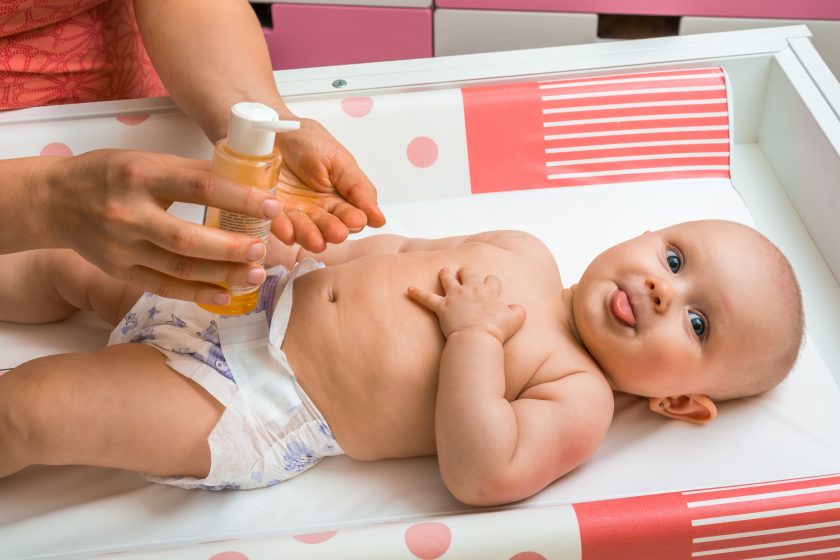- Weight gain (or “how to grow a buddha baby”)
There’s nothing better than squishy little newborns, and when they’re extra new, we need to help them pack on the pounds. Studies on moderate-pressure massage on newborns show an average greater weight gain of 5 grams per day when compared to non-massaged infants, with particularly positive results in pre-term bubbas. The results are even better when oil is used. The link between massage and weight gain is attributed to the stimulation of pressure receptors under the skin which increase vagal activity. Vagal activity refers to the efficient-functioning of the vagus nerve, one of the main contributors to the system responsible for calming organs after the body has been in ‘fight or flight’ mode. This, in turn, stimulates gastric motility which moderates weight gain in little ones.
- Massage pain away
Think back to that blissful pleasure you feel when you walk out of your massage room. Now imagine being in that state every time you have to do something traumatic, like pay a $800 electricity bill. It’d be slightly more palatable, right? Your baby agrees. The science behind the bliss is the release of endorphins and serotonin during massage, which induces a calming, relaxing sensation and dramatically boosts your mood. This same principle applies when bub has to undergo painful procedures like vaccinations and heelsticks. Both premie and full-term babies benefit from massage therapy 20-30 minutes prior to such treatments; they cry less, maintain lower heart rates and are easier to console.
- Sleep, glorious sleep
Okay, this one may be slightly geared towards parental satisfaction, but we swear it benefits baby as well. Setting up a sleep rhythm is arguably one of the toughest (most torturous?) aspects of welcoming a new addition to the family. When you’ve exhausted ‘cry it out’ methods, sleep training, feeding to sleep, endless patting, and cot sleepovers (don’t pretend you haven’t considered it!), massage may be your saving grace. It works by increasing melatonin levels in newborns, which is linked to deep, restorative sleep, as opposed to REM sleep. Massage before bedtime – even if it’s just 15-20 minutes – is soothing and calming and helps to gently adjust bub’s circadian rhythm.
- Reflux be gone!
Noone enjoys the burning sensation of gastroesophageal reflux and a LOT of babies are hit hard with it; at least 40% of them! As your little one is still developing, the muscular valve which connects the food pipe to the stomach may not be strong enough to work efficiently after every feed, allowing milk and acid to flow back through the food pipe. It’s uncomfortable and it’s messy. While massage won’t eliminate this issue, it can help by a) comforting distressed babies, and b) promoting the development of the muscles over time. Remember the vagus nerve that we spoke about earlier? It plays an especially important role in the digestive system. When the vagus nerve is stimulated by massage, it prompts the nerves in the body (specifically, in this case, the nerves which control the valve between the oesophagus and stomach) to develop more quickly. This allows the muscle to operate more effectively sooner, and reflux symptoms will ease.
- Bonding, baby
You’ve already heard of the benefits of Kangaroo care for newborns, especially those who are born prematurely. Skin-to-skin contact is where it’s at. Imagine if you were comfortably tucked up in a soft, warm pouch and are suddenly evicted and subjected to the sterile atmosphere of a hospital? It’d take a little while to adapt. As the skin is the largest sensory organ of the body, positive touch is crucial in providing comfort and bonding with newborns, especially if they are required to undergo traumatic medical procedures in these early stages. The increase in endorphins and decrease in cortisol (i.e the ‘stress hormone’) during massage will significantly aid this transition. It has shown similarly positive results for mummies and daddies administering the treatment, with noteable reductions in anxiety, postpartum depression and psychological distress caused by separation in NCIU for parents. Infant massage is a special bonding experience for you and your little one and it sets up some great foundations for a happy home life.
Sources:
Abdeyazdan, Z et. al., (2013). ‘A comparative study on vaccination pain in the methods of massage therapy and mothers’ breast feeding during injection of infants referring to Navabsafavi Health Care Center in Isfahan’, Iranian Journal of Nursing and Midwifery Research, 494-498
Baby Centre (2017). ‘Reflux’, Available at: https://www.babycentre.co.uk/a567208/reflux, [accessed 28 Aug. 2017]
Bond, C, (2002). ‘Positive touch and massage in the neonatal unit: a British approach’, Semin Neonatal, 477-486
Field, T (2017). ‘Newborn massage therapy’, International Journal of Pediatrics and Neonatal Health, 54-64
Field, T, Diego, M (2009). ‘Vagal activity, early growth and emotional development’, Infant Behaviour and Development, 361-373
Melt Method, (2016). Why vagal tone is so important, Available at: https://www.meltmethod.com/blog/vagus-nerve/, [accessed 28 Aug. 2017]
Infant Massage Information Services, (2012). How infant massage can help with reflux, Available at: http://blog.babymassage.net.au/infant-massage-reflux/, [accessed 28 Aug. 2017]

